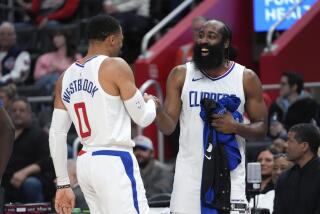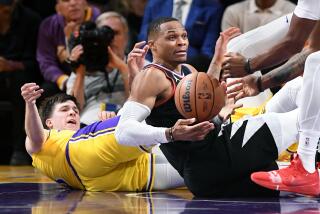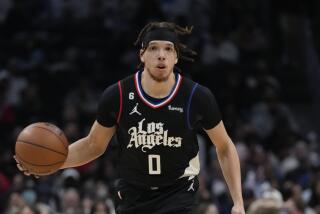He Still Runs With the Bulls : Clippers: Brian Williams tries to experience all there is to life--and he makes a good center too.
- Share via
A crowd of autograph seekers gathered outside the Federal Building in Denver as limousines discharged NBA players who were voting on the collective bargaining agreement one day last summer.
“Look, it’s Dikembe Mutombo,” a fan said as he rushed to get the Denver Nugget center’s autograph.
Just then, Clipper center Brian Williams breezed past the startled fans on a skateboard.
Although the NBA had provided players with limousine transportation, Williams thought it was a waste of money.
“Limos are for proms,” he said. “If you like riding a skateboard you should ride a skateboard. Just because I’m in the NBA doesn’t mean I have to drive a Porsche.
“It was the simplest mode of transportation. I knew there wouldn’t be parking, so what’s the big deal? People try to blow it up like it was a statement against the league providing limousines for players. I was just trying to get there and get away.”
Williams, traded by the Nuggets to the Clippers in a draft-day deal last June, has always marched to his own Walkman. And no one is safe from his wit.
During a blowout loss at Seattle last month, Williams began playfully punching the Seattle Mariners’ mascot, who was dancing with the SuperSonic mascot near the Clipper bench.
And overhearing teammate Stanley Roberts explaining that he had had the word Franchise tattooed on his arm because his teammates had begun calling him a franchise player, Williams broke in, “That’s because he owns a couple of Kentucky Fried Chicken franchises.”
Asked what he thought of a replacement referee who called a technical foul on him in a game at Sacramento last month, Williams said, “He should have gotten an Academy Award for acting like an official.”
And after Phoenix forward Charles Barkley had kicked him below the belt in the Clippers’ season-opening victory over the Suns, Williams quipped, “Charles Barkley played soccer with my . . .”
*
Williams was nicknamed “the Renaissance Man” by his teammates at the University of Arizona because of his interests in music, the arts and literature, but he was immersed in music long before he got to college.
His father, Gene, was the lead singer of the Platters, one of the most successful pop music groups of the 1950s and ‘60s.
His parents divorced when he was young--”before I had a memory”--and Williams moved to Fresno with his mother, Patricia Phillips. But he spent the summers on the road with his father.
“The bizarre thing about it was that I rarely saw my father except in the summer because he was on tour,” Williams said. “During summer vacation I’d go to Vegas or Tahoe, where he was performing. I was 7 or 8 years old and I was more concerned with going to Circus Circus than watching him play.”
Still, that early exposure left its mark. Williams plays the trumpet and has dabbled in rap music. But his interests go well beyond sports and music.
“I think the search for knowledge shouldn’t stop until you stop breathing,” Williams said. “That’s what pushes me.”
While his teammates napped or watched soap operas before a recent game in Seattle, Williams went to the aquarium. He also has visited art museums and libraries before road games.
He owns a vintage Harley-Davidson motorcycle, but he doesn’t ride it.
“I drain the oil and gas and leave it in my house as art,” Williams said.
Many NBA players spend their summers playing basketball and lifting weights, but Williams spends his exploring life.
He has run with the bulls in Pamplona, Spain, and he bicycled 750 miles from Salt Lake City to Phoenix in 2 1/2 weeks.
“I ran with the bulls . . . I ran my butt off too,” Williams said. “I was in the neighborhood, so I did it. That’s just something you don’t do every day. It was a memory. I don’t think I’ve had to run as fast since. There’s an element of fear to it.”
On the long bike ride, Williams and a friend set out with nothing except a credit card.
“We decided to see if we could be iron men,” Williams said. “We’d do about 70 miles a day. It was hell. But there’s a way of romanticizing things like that once you’ve completed them. I’m telling you, going through the desert riding a bike for five hours straight without eating was hell.
“I got so sunburned that at one point I couldn’t even hold my neck up anymore. I just had to look down at the road because my neck was so tired. At one point I even flagged down a car and bought food off them so we could get to the next town.
“It was just testing yourself to see how far you could push yourself and keep your sanity.”
Williams spent most of last summer in New York, exploring the city on in-line skates. He even played in an in-line basketball league.
“Roller-blading was great conditioning,” Williams said. “I almost got hit by a couple of cabs. Some of those guys drive like they shouldn’t have a driver’s license.”
*
Williams has played for three teams in five NBA seasons.
Drafted by the Magic with the 10th pick in 1991, he spent two unhappy seasons in Orlando.
“When I got off the plane for my initial visit to Orlando, I was being brought in to work out. Five minutes outside the airport, I thought to myself, ‘This place and I don’t mix. The energy of this place just doesn’t fit me.’
“And lo and behold, I went there and had a good workout and ended up being drafted by them. I was really trying to be happy at the draft, but I knew all along that I just didn’t fit in.
“It was like the Biosphere [experiment] in Arizona, where the environment is completely artificial. You can say that it’s beautiful to create something like that, but to me, as far as the culture and the ability to walk down the street and see diversity and feel that you’re not in some homogenized bubble, I just couldn’t get beyond that.”
Williams was sidelined for almost two months of the 1992-93 season after he was put on the injured list because of clinical depression.
“I think it was just a balance between diet and physical and mental illness,” he said. “There were no drugs involved. I was borderline anemic. I was a vegetarian my first two years [in the NBA] and because of the demands on your body, you can’t do that and maintain your pace.
“I think when I was in Orlando, I wasn’t very open as a person. I think any time you’re not communicating, it leads to misunderstandings. I wasn’t happy there. I didn’t get along with the coach or the city. I basically let it wear me down.
“To this day, I don’t know that the physical aspects are separated from the mental. I just know that I started suffering. At that point, a lot of other things began to become exposed about what I felt about my childhood and a lot of other things. That’s just part of maturing.”
Traded by the Magic to the Nuggets before the 1993-94 season, Williams flourished in Denver, averaging eight points and 5.6 rebounds as a backup to Mutombo.
“I moved on,” Williams said. “The trade helped me put that all behind me. When I was in Denver, a lot of that misunderstanding was laid to rest.”
Williams had a career-high 19 rebounds and 17 points as the Nuggets upset the Seattle SuperSonics, who had compiled the NBA’s best record, in the first round of the 1994 playoffs.
Williams was at his best in the stretch run as Denver battled the Sacramento Kings for a playoff berth last season. He made eight of nine shots and scored 18 points as the Nuggets clinched their second consecutive playoff berth with a season-ending victory over the Kings.
But he had difficulty adjusting to the Mile High City.
“I don’t think I ever got accustomed to the altitude in two years there,” Williams said. “My nose ran every day for two years. Even when you’re in shape, you always had to get your second wind two minutes into practice or a game.”
Williams was in Spain last summer when he learned that he had been traded to the Clippers, along with forward Rodney Rogers and rookie guard Brent Barry of Oregon State, for Alabama forward Antonio McDyess, center Elmore Spencer and guard Randy Woods.
“I got to my hotel and there was a message sitting on my pillow,” he said. “My agent had called and the message said, ‘You’re sailing with the Clippers.’ I was trying to understand what it meant. I thought it was the operator’s Spanish translation. I had to call him back.
“You know when you get that pit in the bottom of your stomach? I knew before I even made the call what had happened.
“At first it was a little difficult to rationally accept a message sitting on your pillow that you’ve got to go home and pack your house and say goodbye to all your friends. I didn’t believe it.”
Williams had just bought a house in Denver.
“I closed on my new house three days before the trade,” Williams said. “I rented there for two years, trying to find a place I really wanted to stay, and then three days . . . I still own it.”
A reserve until this season, Williams has flourished as the Clippers’ starting center.
Clipper Coach Bill Fitch said Williams is often misread because of his diverse interests, but it doesn’t interfere with his basketball.
“If you line up all 29 centers, Brian can play with any of them and none of them would feel like they had a night off,” Fitch said.
Shooting a team-high 52.6%, Williams helped the Clippers get off to their best start in 20 years. He scored a season-high 28 points, one shy of his career high, as the Clippers defeated the Dallas Mavericks last month for their fifth consecutive victory, their longest winning streak since March 1992.
Williams ranks second on the Clippers in scoring with a 15.3-point average, in rebounding with a 6.6 mark, and in blocks with a .63 average.
And first in individuality.
More to Read
Get our high school sports newsletter
Prep Rally is devoted to the SoCal high school sports experience, bringing you scores, stories and a behind-the-scenes look at what makes prep sports so popular.
You may occasionally receive promotional content from the Los Angeles Times.






